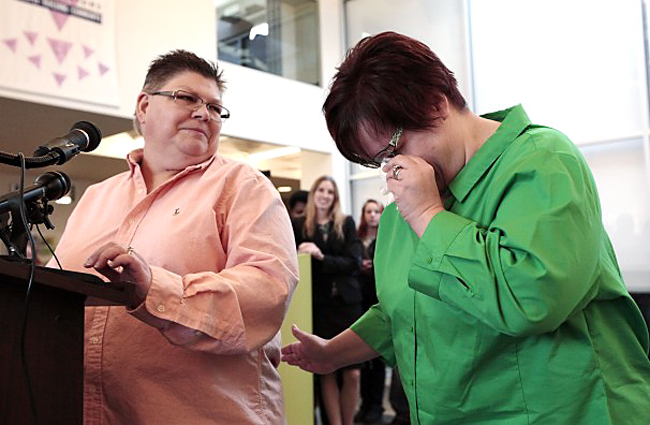On March 21, federal judge Bernard Friedman struck down Michigan’s 2004 law banning same-sex marriage. The decision, despite pertaining to another state, still paid a great deal of attention to Texas, or at least to research conducted by UT sociology professor Mark Regnerus.
In his opinion, the judge drew on emails obtained through open records requests and Regnerus’ testimony in court to conclude that Regnerus’ gay parenting study was “concocted at the behest” of Regnerus’ funders, the conservative Witherspoon Institute and Bradley Foundation, to be used at the Supreme Court. Friedman wrote that Regnerus “obliged” his politically minded funders — funders who “clearly wanted” predetermined results that would protect “the funder’s concept of ‘the institution of marriage’” from the assault by the prevailing social science consensus.
A Pre-trial deposition by Regnerus’ colleague and fellow witness BYU economics professor Joseph Price also exposed a previously unknown connection between Regnerus’ study and the Heritage Foundation, a conservative think tank. According to The New York Times, Heritage hosted various meetings to help coordinate Regnerus and others’ research that they hoped would halt gay marriage victories in court.
According to the deposition, Regnerus attended at least one such meeting, as did the state’s other social science expert witnesses. The judge, a Reagan appointee, concluded that whatever his interpretations, “[Regnerus] certainly cannot purport to have undertaken a scholarly research effort” on gay parenting outcomes.
Such a pointed rebuke by a legal authority embarrasses Regnerus, but it also gives the University a simple way to revisit its own August 2012 decision to defend Regnerus against allegations of “scientific misconduct.” UT should scrutinize the Michigan trial testimonies and determine whether the new evidence presented warrants some sort of formal action or whether the University should once again reaffirm that Regnerus has done nothing wrong. Mainly, UT should consider whether Regnerus was dishonest regarding the “proposing, conducting, or reporting” of his findings.
Although the University recently distanced itself from Regnerus’ opinions, in the 2012 inquiry, the University found no evidence that Regnerus violated ethics norms. Based on the scant evidence at the time, the University had a point. Having not yet filed briefs or testified, Regnerus argued that he had merely put out controversial research to let other scholars and organizations interpret the findings as they wished, a stance even I accepted at the time. Regnerus’ own study warned against politicizing his findings and claimed that it could not answer questions surrounding the “legal legitimacy” of gay marriages. Regnerus also claimed in his article that “the funding sources played no role at all in the design or conduct of the study, the analyses, the interpretations of the data, or in the preparation of this manuscript.” These arguments, weighed by Friedman in a court of law, were unnecessary, misleading and unethical. After all, Regnerus, like any activist researcher, could have simply acknowledged the funders’ involvement in his study and explained that he wished to stop the prevailing consensus. Instead, he hid their involvement.
According to the emails released in February 2013, Regnerus asked Witherspoon for feedback regarding the study’s boundaries, timelines and the funders’ hopes for what the project might produce. Regnerus admitted on cross-examination that he filed away Heritage Foundation media talking points regarding his research after giving a talk on his study there days before the study’s publication. When questioned further, he said he “largely ignored” the document.
Regnerus is not the first professor to have disclosure issues. After initially promoting former geology professor Charles Groat’s fracking study in July 2012 — around the same time Regnerus’ study came out — the University reprimanded Groat and updated its disclosure policies a few months later. In December 2012 an independent investigation noted deficiencies in UT’s procedures and confirmed that his employment by the company he was studying constituted a conflict of interest.
Regnerus seemed to cross the line from “good-faith disagreements,” a plausible defense against misconduct allegations, and possible incompetence, to dishonesty in reporting his research, testifying and filing briefs across the nation even though his study warned it could not address the politics of gay marriage. Furthermore, non-disclosure on his part in a coordinated effort by Heritage, another conservative organization, to get multiple politically charged studies into the courtroom while his study was being routed through the Population Research Center recklessly put the University’s reputation on the line based only on partial disclosure.
While Regnerus was not employed by Witherspoon, Regnerus seemed to produce his study’s conclusions for both ideological and financial reasons. Regnerus told the Texan he accepted Witherspoon and the Bradley Foundation’s $785,000 grant because receiving a National Institute of Health grant, typically $477,215 for 2011 according to the institute, for a polarized topic was time-consuming and unlikely. According to Regnerus, the survey cost around $415,000 total.
Some may ask why UT should bother pursuing a once-reputable scientist whose testimony has already been discredited and whose department has already distanced itself from his opinions and interpretations in court, citing the “highest ethical standards” of the department. Nevertheless, the evidence that has surfaced since the initial allegations suggests not only that Regnerus misled the academic community from the beginning, but also that he unnecessarily bent the academic process to present himself as unbiased in his research. If Friedman is correct that the funders influenced the research, Regnerus deserves direct institutional rebuke. If Friedman is incorrect, the University should defend Regnerus against the judge’s opinion. Either way, in the light of new evidence, the University must settle the question of Regnerus’ ethical behavior.
Knoll is a first-year master’s student in Latin American studies from Dallas.





















